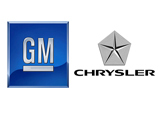GM and Chrysler Agree on Major Deal Points
 |
NEW YORK/DETROIT October 29, 2008; Jui Chakravorty Das and Kevin Krolicki writing for Reuters reported that General Motors Corp and Cerberus Capital Management have resolved the major issues in a proposed GM-Chrysler merger, but the final form of any deal would depend on the financing and government support available, sources familiar with the talks said on Wednesday.
Both sides have agreed that GM Chief Executive Rick Wagoner would lead the combined automaker, the sources said.
A merged GM-Chrysler would be the largest automaker by global sales, but analysts have cautioned it would struggle to turn around the overlapping Detroit-based operations of two companies that have seen mounting losses tied to a global downturn in sales.
GM shares jumped by as much as 11 percent in reaction to news of progress in the merger talks. GM bonds also moved higher and the cost to insure the company's debt against default fell.
As GM seeks some $10 billion in U.S. government aid to support the deal, Chrysler owner Cerberus is in its own set of intense discussions with banks to refinance billions of dollars in Chrysler debt, the sources said.
GM has been in talks with Cerberus about buying Chrysler since last month, but the discussions have been snagged by difficulty in securing investment or financing.
A decision by the Bush administration to provide the government's first funding for the auto sector since the $1.5 billion bailout of Chrysler in 1980 has been widely seen as the merger's best chance for success.
GM and Cerberus declined comment. A United Auto Workers union spokesman had no immediate comment.
Chrysler's lending consortium -- which includes JPMorgan Chase & Co , Goldman Sachs Group Inc , Citigroup Inc and Morgan Stanley -- has not made a decision yet, and talks are complicated because lenders have sold part of the debt to other investor groups, the sources said.
The banks hold the first-lien loan of $7 billion issued to finance the Cerberus buyout of an 80 percent stake in Chrysler from Daimler AG last year. Banks have been selling off parts of it in an effort to trim their exposure to risky leveraged buyout debt.
A failure to refinance that debt could require the merged company to pay it off in full because of a change in control. That would be difficult given GM and Chrysler's struggle to preserve cash at a time when their core operations are under increasing strain.
GM burned through $1 billion a month in the second quarter and its cash burn rate is expected to have increased in the third quarter when its global sales dropped 11 percent.
Chrysler, now in a dead heat with Honda Motor Co for the No. 3 spot in the U.S. market, has been hardest hit by the slump because of its dependence on the U.S. market for some 90 percent of sales.
Chrysler's sales have fallen 25 percent through September, while GM's sales are down 18 percent. Industry-wide sales are expected to drop near 30 percent in October.
GM and Chrysler have responded by slashing jobs and delaying vehicles in development.
But as it sought backing for the proposed deal, GM has consulted with the UAW during its talks with Cerberus, people familiar with the negotiations said.
As a condition of government support, GM has offered to merge the auto operations in a way that protects as many jobs and as much of the Chrysler sales volume as possible, sources have said. Taken together, GM and Chrylser have some 97,000 union-represented factory workers.
GMAC ROLE SEEN KEY
One element of the GM-Cerberus talks has involved GMAC, the GM-affiliated finance company in which Cerberus owns a controlling 51 percent stake, people with knowledge of the talks have said.
Cerberus is keen to increase its holding in GMAC and has considered merging it with Chrysler Financial, Chrysler's captive finance company, at a time when the financial firms stand to benefit from new government steps aimed at the tight credit markets, sources said.
GMAC, which has some $20 billion in outstanding debt and has faced a tougher market for its financing, said on Tuesday that it had been approved to borrow through the U.S. Federal Reserve's recently created commercial paper facility.
A U.S. Treasury spokeswoman said on Wednesday that GMAC and other automotive finance companies could sell distressed assets in upcoming auctions to shore up their balance sheets.
The cost to insure GMAC and GM debt with credit default swaps dropped. Credit default swaps on GM's debt have fallen to around 60 percent the sum insured upfront, from around 70 percent at the start of the week.
Reporting for Reuters by Jui Chakravorty Das in New York and Kevin Krolicki in Detroit with additional reporting by David Lawder in Washington and Karen Brettell in New York, editing by Matthew Lewis


